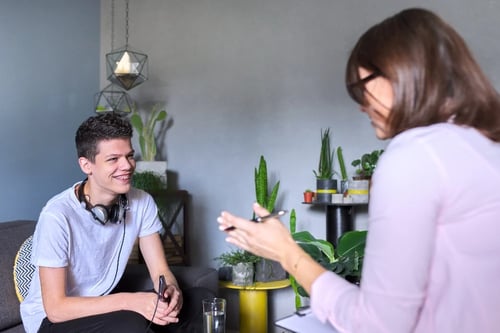The Power of DBT: How It Reduces Teen Self-Harm
Discovering a child engages in self-harm ignites desperation in parents to make the dangerous behavior cease. But punitive approaches often backfire by fueling shame behind it. Among available therapies, dialectical behavior therapy (DBT) demonstrates proven outcomes reducing teen self-injury through compassionately teaching emotional regulation skills.

Table Of Content
- What is Dialectical Behavior Therapy?
- How Trauma Impacts a Teen's Mental Health
- DBT Emotion Regulation Skills
- Inside the DBT Process for Teens
- Crafting a Life Worth Living
Initially created to treat borderline personality disorder, DBT’s success has led to wide adoption for adolescents struggling with self-harm and suicidal thinking. Its evidence-based toolkit equips teens to tolerate distress in healthier ways, finding light even amid the darkest inner pain. m and Trauma in Teens?
What is Dialectical Behavior Therapy?
Dialectical behavior therapy blends core principles from cognitive behavioral therapy (CBT) with concepts of distress tolerance, mindfulness, and interpersonal effectiveness. Key elements include:
-
Individual therapy that coaches teens through DBT skill implementation
-
Group skills training classes to practice emotional regulation techniques
-
Validation that accepts teens’ emotions without judgment
-
Balancing change and acceptance of emotions via “dialectics”
-
Prioritizing generalizing skills into everyday life
DBT assumes teens engage in self-harm because they lack appropriate skills to cope with intense emotions but can learn these skills through compassionate support.
Why DBT Works for Self-Harm
How Trauma Impacts a Teen's Mental Health
Both quantitative data and anecdotal experience demonstrate DBT’s effectiveness in reducing self-injury. What makes it impactful?
-
A non-judgmental stance avoids shaming teens for coping mechanisms.
-
It encourages skill use with warmth versus rigid control of behavior.
-
It focuses on problem-solving current issues prompting self-harm.
-
Teens take ownership by selecting treatment goals they find relevant.
-
It relies on adolescence-appropriate metaphors like “surfing waves” of emotion.
-
The concrete, easy to comprehend techniques translate into everyday life.
-
Combining individual and group therapy ensures thorough skill review.
-
It builds family support via caregiver meetings and coaching calls.
-
Prioritizing generalization helps teens apply skills flexibly across contexts.
-
Ongoing assessment monitors efficacy and adjustments needed.
DBT’s compassionate, teen-centered approach makes it resonate. Practicing tailored coping skills grows your teen’s confidence that they can ride out self-harm impulses.
DBT Emotion Regulation Skills
DBT Emotion Regulation Skills
DBT equips teens with specific techniques across four modules targeting problematic areas:
1. Mindfulness
-
Nonjudgmental focus on the present moment
-
Observing thoughts and feelings without reacting
-
Using a wise mind to balance emotion and reason
-
Participating fully in current activities
2. Distress Tolerance
-
Distracting from the urge to self-harm
-
Self-soothing the senses through vision, scent, and touch
-
Improvement of the moment through relaxation and imagery
-
Reducing vulnerability to urges through sleep, nutrition, and exercise
3. Interpersonal Effectiveness
-
Maintaining self-respect and morals in relationships
-
Asking for what one wants assertively
-
Saying no skillfully
-
Coping ahead for stressful interactions
4. Emotion Regulation
-
Identifying and labeling emotions
-
Reducing emotional vulnerability
-
Increasing positive emotional events
-
Applying distress tolerance techniques
Teens build confidence by practicing these techniques first in safe settings like skills groups before using them independently when urges for self-harm surface.
Inside the DBT Process for Teens
Inside the DBT Process for Teens
While specific treatment plans personalize the process, DBT’s standard format provides a helpful structure.
-
Initial assessment pinpoints problematic behaviors and needed skill building.
-
Individual therapy focuses on using the skills to achieve treatment goals like reducing self-harm.
-
Skills groups allow for peer learning and practicing DBT techniques together.
-
Coaching calls provide real-time support practicing skills outside of sessions.
-
Caregiver sessions offer guidance on using validation and reducing family conflict.
-
Skills generalization help teens apply coping methods flexibly in everyday life.
-
Self-monitoring logs track progress and reveal skills needing more work.
With consistent skills practice and a compassionate social support circle, teens build belief in their ability to ride out the storm of emotions without self-destructing.
Crafting a Life Worth Living
Crafting a Life Worth Living
DBT’s kind yet pragmatic approach offers teens hope. By accepting them as they are yet arming them with better strategies for enduring despair, DBT sets struggling adolescents on the path to crafting a life of purpose beyond pained pasts.
The road requires persistence, but teens willing to stay the course consistently report decreased depression, suicidal thinking, and self-harm after learning DBT techniques. They create the lives envisioned for them, no longer controlled by inner demons.
Though isolation whispers they are too broken to heal, compassion and skills training rewrite hurt into empowerment. Teens deserve empathy as they walk the winding road, but they also deserve tools to transform pain into purpose. By building emotional muscles, DBT lights the way into their bright futures.
Let Idaho Youth Ranch help your teen
Teen Counseling
Our masters-educated and trained therapists and counselors have the experience your young person needs to find healing.
Family Counseling
Idaho Youth Ranch can help your family reconnect, open up lines of communication, and build more positive relationships.
Group Counseling
Group therapy helps young people, ages 9 to 24, to address trauma, dangerous behaviors, troubling feelings or experiences.
Equine Therapy
Working with horses has been a proven method of emotional recovery and one of the unique services offered by Idaho Youth Ranch.


.webp?width=500&height=334&name=Idaho%20Youth%20Ranch%20Family%20Counseling%20(1).webp)

